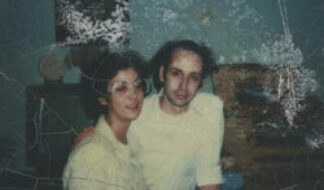When Sufjan Stevens Finally Came Out, He Broke Our Hearts
Where did all that speculation get us?

For two decades, curious queer fans of the enigmatic indie singer-songwriter (and Detroit-born and Michigan-raised) Sufjan Stevens have pored over his equally enigmatic lyrics for the reverse red herring that would finally put the question to rest. Is he? He must be... right?
Many of his songs reference emotionally intimate relationships and moments with men (and women, too). And then there are the probing articles that ponder what’s up with all the curiosity, like the bluntly titled Vice piece “We Can’t Stop Wondering if Sufjan Stevens Sings About God or Being Gay,” which explores the internet fascination with his sexual orientation.
At a high level, the speculation is fraught with inappropriateness — it would absolutely not be OK to engage in this kind of intense investigation about the LGBTQ+ status of someone in your real life. And yet, there’s a unique earnestness here. The queer community who loves Sufjan simply wants to invite him into the fold, to make sure he knows how loved he is, whoever he is. Frankly, he’s so often singing from the aching, bludgeoned hollow of his broken heart that we just want him to be happy and whole.
Given Sufjan’s intimate relationship with sorrow, it’s maybe not surprising that when he did lay the speculation to rest last week, it was in a post honoring his “beloved partner,” who died in April. Next to a photo of said beautiful partner, Evans, he wrote, “This album is dedicated to the light of my life, my beloved partner and best friend Evans Richardson, who passed away in April. He was an absolute gem of a person, full of life, love, laughter, curiosity, integrity, and joy. He was one of those rare and beautiful ones you find only once in a lifetime — precious, impeccable, and absolutely exceptional in every way.”
“I know relationships can be very difficult sometimes, but it’s always worth it to put in the hard work and care for the ones you love, especially the beautiful ones, who are few and far between,” Sufjan continued. “If you happen to find that kind of love, hold it close, hold it tight, savor it, tend to it, and give it everything you’ve got, especially in times of trouble. Be kind, be strong, be patient, be forgiving, be vigorous, be wise, and be yourself. Live every day as if it is your last, with fullness and grace, with reverence and love, with gratitude and joy. This is the day the Lord has made. Let us rejoice and be glad in it.
Such a Sufjan way to gently shock our senses while publicly coming out as part of the LGBTQ+ community, oh so casually. It’s doubtful we’ll see a dramatic shift in the way he writes his music or lives his life. The theories will continue filling the pages of the Sufjan subreddit, and he’ll keep giving those theories little mind — hopefully, he’ll simply continue pouring himself into music and sharing it with the world.
In the meantime, we can now take a fresh look at some of Sufjan’s potentially queer-coded songs without it feeling quite as much like wishful thinking. Some of the tracks below have frequently been cited as part of the “evidence.” Still, like any good songwriting, there’s much left to listener interpretation in his always honest, sometimes autobiographical writing. Sometimes, it really is about God, and maybe sometimes, it’s about a man or woman he has loved romantically or platonically. Sometimes, the protagonist isn’t even him.
Perhaps that’s what’s always made Sufjan’s music so widely resonant and why, ultimately, it doesn’t actually matter if he’s been explicitly or implicitly singing about his sexuality for the past two decades. At its center, Sufjan’s body of work is a testimonial to the human experience in all the joyful, sorrowful, redemptive, regretful ways every one of us holds at different moments.
“The Predatory Wasp of the Palisades Is Out to Get Us”
From “Illinois,” 2005
The speculation here focuses on these lyrics: “Touching his back with my hand I kiss him/I see the wasp on the length of my arm.” Is the wasp a metaphor for the “sting of love,” as one listener wrote on lyric-analysis site genius.com? “The wasp,” the listener continues, “is a metaphor for the church’s anti-homosexuality stance. Seeing it refers to his sudden realization that his feelings are, supposedly, morally wrong. The wasp resting on his arm (rather than hovering around them) shows that his fear of his attraction betraying his faith is very much internalized and could sting at any moment. Like swatting a wasp, attempting to push that fear away threatens to make it worse.”
“Futile Devices”
From “The Age of Adz,” 2010
Among the more bitterly debated songs when it comes to clues about Sufjan’s sexual orientation, “Futile Devices” could be about a lot of things. Platonic male friendship. Love between man and dog, according to some internet theories. A queer love story between two men. A heterosexual love song where he calls his female partner his brother because... reasons. All we definitively know is that he sings gorgeous lines like these, and they make us feel stuff: “But you are the life I needed all along/I think of you as my brother/Although that sounds dumb/And words are futile devices.”
“Drawn to the Blood”
From “Carrie and Lowell,” 2015
A devastating track off a devastating album centered on Sufjan’s journey through the grief of losing his frequently estranged mother to cancer, “Drawn to the Blood” is primarily seen as a biblical allegory. One stanza stands out as something more personally reflective: “The strength of his arm/My lover caught me off guard.” In a 2015 interview with Uncut, he confirmed that the abusive relationships described here was his own.
“Mystery of Love”
From the “Call Me By Your Name” soundtrack, 2017
Sung from the perspective of main character Elio, “Mystery of Love” details the breakdown of Elio’s relationship with Oliver. The track isn’t autobiographical, but the fact that Sufjan was so involved with this seminal queer film, alongside his powerful performance of the song at the 2018 Academy Awards (with partner Evans in the audience), demonstrates some personal importance. It’s trademark Sufjan all the way through, with lyrics like, “Oh, to see without my eyes/The first time that you kissed me/Boundless by the time I cried/I built your walls around me.” The soundtrack also includes a reprisal of “Futile Devices.”
Songs from “Javelin,” 2023
Finally, we have “Javelin,” the newly released album Sufjan has publicly dedicated to his partner Evans. We don’t have an official timeline for this relationship, but the two had known one another for years, dating back to as early as 2018. There are many moments that stand out in the track list that could be referencing this love story, including: “So you are tired of us/So rest your head/Turning back fourteen years/Of what I did and said” on “So You Are Tired.” And on “Running Start,” we have the bittersweet memory of a boundless loving moment: “If I align myself with Pisces in a funny way/Can you, my lovеr, kiss my bracelet, and my shoulder blades?/We’ve always had a running start/I jump between the trampolines/You throw your arms around my heart/As if to say you're all I need.”










